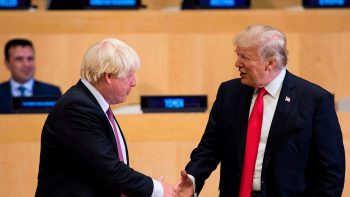Is debt the kryptonite of America’s "superpower" status?
Kai Ryssdal: While President Obama enjoys the start of his vacation on Martha’s Vineyard, Vice President Joe Biden is halfway around the world doing the heavy economic lifting. He’s in Beijing trying to convince the Chinese their investment in U.S. Treasury bonds is safe. “Nothing to worry about” is literally what the V.P. said.
Be that as it may, the Chinese are worried. They’ve got $1.5 trillion riding on us. But should we be more worried? What’s the correlation between amount owed and economic and political peril?
From London, Marketplace’s Stephen Beard has an example from history.
Stephen Beard: China’s colossal purchases of American debt have helped keep U.S. interest rates low. But, says Neil Mackinnon of VTB Capital, there is a downside.
Neil Mackinnon: This dependence on Asian central banks is certainly a weak point, very much the Achilles’ heel for American financial markets and the economy generally.
If China stopped buying T-bills and sold a big chunk of those it already owns, it could send U.S. interest rates soaring and cripple the American economy. Highly unlikely to happen? Yes, but something similar has occurred before — to Britain in the 1950s, as it declined as an imperial power.
Andrew Hilton: I think there’s a parallel between the U.S. and the U.K.
Andrew Hilton of the CSFI think tank.
Andrew Hilton: The U.S. is vulnerable. The U.S. has been living beyond its means as Britain was living beyond its means.
In the 1950s, while heavily in debt, Britain discovered the dangers of being in hock to foreign governments as it struggled to maintain its tottering empire. In 1956, Egypt’s President Nasser nationalized the Suez Canal. Britain — among others — staged an invasion to regain control. U.S. President Eisenhower objected.
Dwight Eisenhower: We believe these actions to have been taken in error. For we do not accept the use of force.
Other governments disapproved and dumped their British bonds and currency. On the brink of financial meltdown, the U.K. begged America for help. The U.S. refused — unless Britain pulled out of Suez. Meekly, Britain caved in.
So what if a big dispute blew up today — over Taiwan, say? Could China exert the same kind of pressure on the U.S. by dumping the dollar? Again, Andrew Hilton.
Hilton: It may threaten to dump, and if it starts to threatens at all, then the markets may get very nervous and start pushing interest rates up. The U.S. is extremely vulnerable.
Of course, China would not want to wreck its best export market. And says Prof. Catherine Schenk of Glasgow University, China would not want to lose billions of dollars worth of its reserves.
Catherine Schenk: The countries that have large U.S. dollar reserves like China can’t really afford to lead to a collapse of the dollar by that threat, so that threat may or may not be credible.
But China may one day be much less dependent on its exports to the U.S. and more able to afford to take a hit in its reserves. The U.S. may well find then — as Britain did in the 1950s — that debt often goes hand-in-hand with decline.
In London, I’m Stephen Beard for Marketplace.
There’s a lot happening in the world. Through it all, Marketplace is here for you.
You rely on Marketplace to break down the world’s events and tell you how it affects you in a fact-based, approachable way. We rely on your financial support to keep making that possible.
Your donation today powers the independent journalism that you rely on. For just $5/month, you can help sustain Marketplace so we can keep reporting on the things that matter to you.


















